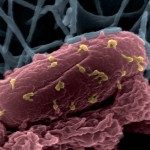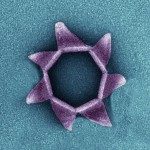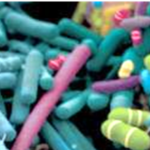Link to Pubmed [PMID] – 29914064
Viruses 2018 06;10(6)
Phage therapy is based on a simple concept: the use of a virus (bacteriophage) that is capable of killing specific pathogenic bacteria to treat bacterial infections. Since the pioneering work of Félix d’Herelle, bacteriophages (phages) isolated in vitro have been shown to be of therapeutic value. Over decades of study, a large number of rather complex mechanisms that are used by phages to hijack bacterial resources and to produce their progeny have been deciphered. While these mechanisms have been identified and have been studied under optimal conditions in vitro, much less is known about the requirements for successful viral infections in relevant natural conditions. This is particularly true in the context of phage therapy. Here, we highlight the parameters affecting phage replication in both in vitro and in vivo environments, focusing, in particular, on the mammalian digestive tract. We propose avenues for increasing the knowledge-guided implementation of phages as therapeutic tools.




